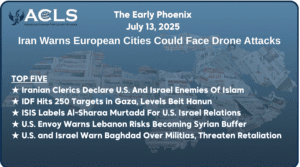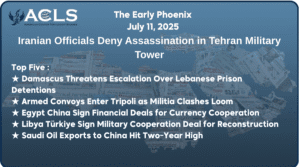TOP HEADLINES:
- Russian Drone Strikes Deal Heavy Blow to 40,000 Tons of Grains Enroute to Israel
- Russia Provides Yemen with Free Grain Shipments
- Canadian Court Orders Iran to Pay $142 Million for PS752 Victims
- UN Security Council Split Over Syria Sessions: Russian Rejection, US Push for Humanitarian Aid
- Iran’s Energy Deals in Iraq Thrive with Prime Minister’s Support
TURKYIE
- Turkish President’s Chief Adviser to Attend Ukraine Peace Talks Hosted by Saudi Arabia (Anadolu Agency). Akif Cagatay Kilic, the chief adviser to Turkish President Recep Tayyip Erdogan, is set to attend the Ukraine peace talks hosted by Saudi Arabia on Saturday. The meeting aims to discuss the current situation in Ukraine and exchange views for achieving peace between Russia and Ukraine. Representatives from various countries and international organizations, including NATO, the EU, and national security advisers from multiple countries, are expected to participate. Kilic will also engage in bilateral talks with counterparts on the sidelines of the meeting. Turkey has been praised for its mediator role between Ukraine and Russia, calling for a peaceful resolution to the conflict.
- UK to Start Talks with Turkey to Refresh Bilateral Free Trade Deal (Arab News). The United Kingdom announced its intention to initiate talks with Turkey to refresh their existing bilateral free trade deal. The current trade agreement between the two countries, which was rolled over when the UK left the EU, is considered outdated. Both sides have reviewed the agreement and concluded that there is room for improvement through a new deal, which could potentially include services and the digital sector. While negotiations are expected to formally begin next year, the trading relationship between the UK and Turkey, valued at £23.5 billion ($30.7 billion) last year, is set to be deepened and tailored to the UK’s economic strengths. The UK government plans to gather input from businesses before the talks commence.
- Canadian Energy Company Enters Agreement for Oil Exploration in Kurdish Region of Turkey (Al Monitor). Trillion Energy, a Canadian oil and gas producer, has entered a “farm-in agreement” with a Turkish company for a 50% working and revenue interest in three oil exploration blocks located in the Cudi Gabar region of southeastern Turkey. The region has been a site of conflict between Turkish security forces and the outlawed Kurdistan Workers Party (PKK). Trillion’s deal involves exploration funding in exchange for partial ownership of the project. The Cudi Gabar region is believed to be part of an active petroleum system that extends from Iraq and Syria and contains significant oil fields. The recent discovery of a billion barrels of oil in the area has been touted as potentially transformative for the Kurdish-majority region’s economy. Critics have raised skepticism about the claims and suggested political motivations behind the announcement.
ISRAEL AND PALESTINIAN TERRITORIES
- Russian Drone Attacks Damage 40,000 Tons of Grains in Ukrainian Port (Jerusalem Post). Early on Wednesday, Russian drone attacks caused significant damage to around 40,000 tons of grains in the Ukrainian port of Izmail. The damaged grains were destined for various countries in Africa, China, and Israel. Russian state news agency RIA reported that the strikes targeted port and grain infrastructure, as well as alleged foreign mercenaries and military hardware. Ukrainian authorities released a video showing the aftermath of the attacks, including large buildings in ruins and grain spilled from damaged silos. The situation highlights the ongoing conflict and tensions between Russia and Ukraine.
- Israel to Increase Natural Gas Exports After New Offshore Discoveries (New Arab). Israel plans to increase natural gas exports as new offshore fields increase reserves by 40%. In 2022, Israel produced 21.29 billion cubic meters of natural gas, with only 9.21 bcm exported to Egypt and Jordan. Israel aims to double gas production and enter new markets, including Europe, to secure economic stability and income for the Israeli economy. Natural gas discovery has brought economic benefits to Israel, lowering electricity prices and reducing its reliance on imports. However, further gas exports are hotly debated, with some advocating for energy independence while others stress the economic and diplomatic benefits of increasing exports.
EGYPT AND AFRICA:
- Security Council Session on Libya in August Amid Concern Over the Electoral Law (Al Wasat). The UN Security Council will hold a special session this August to review the developments in the situation inside Libya, amid great concern about the delay in agreeing on an election law that paves the way for the national elections at the end of this year. During the session, the Council will review developments in the political process, security, and humanitarian developments in Libya, and will also discuss the latest report of the Secretary-General of the United Nations, Antonio Guterres, on the work of the Special Mission in Libya, according to what was published by the Security Council Report, today, Wednesday.
- Saudi Arabia Grants $1.5 Billion for 3,524 Projects in Egypt, Generating Thousands of Jobs (Egypt Independent). The Saudi Arabia Grant Management Committee (SAGMC) has provided $1.5 billion to finance 3,524 projects in 27 governorates across Egypt, creating around 17,000 job opportunities in sectors such as industry, agriculture, healthcare, trade, and more. This Saudi grant marks the third agreement signed between SAGMC and Egypt’s Ministry of International Cooperation, continuing their cooperation in supporting micro, small, and medium-sized projects. Notable beneficiaries include financial institutions like the National Bank of Egypt and the Agricultural Bank of Egypt, as well as direct grant financing recipients like EFG Hermes Leasing Company and Enmaa Finance Company. The recent agreement was witnessed by Minister of International Cooperation Rania Al-Mashat.
GULF REGION & YEMEN
- Israeli Solar Company SolarEdge Partners with Ajlan & Bros for Solar Energy Adoption in Saudi Arabia (Jerusalem Post). Israel’s leading solar energy company, SolarEdge, has entered a joint venture with Ajlan & Bros Holding (AHB) to promote the adoption of solar energy solutions in Riyadh, Saudi Arabia. The partnership aims to support Saudi Arabia’s Vision 2030 initiative, which aims to reduce the country’s dependence on oil and promote renewable energy. The joint venture will offer a range of SolarEdge products, including production, storage, and energy management solutions, as well as consultancy services for organizations transitioning to renewable energy. The move reflects the growing ties between Israel and Saudi Arabia, despite the absence of official diplomatic relations.
- Yemeni Ambassador Discusses Challenges and Cooperation with Russia on Safe Shipments Amidst Energy Crisis (Sputnik Arabic). In an exclusive interview with “Sputnik,” Yemen’s ambassador to Russia, Ahmed Al-Wahishi, highlighted the 95th anniversary of the Treaty of Cooperation and Friendship between Russia and Yemen. Amidst the challenges faced by developing countries like Yemen and the ongoing energy crisis, Al-Wahishi emphasized the need to secure shipments to Yemen safely. He revealed ongoing discussions with the Russian Foreign Ministry to address obstacles and difficulties facing these shipments. Coordination with the World Food Program is also taking place to overcome these challenges, involving Russian Foreign Minister Sergey Lavrov and Deputy Minister Mikhail Bogdanov.
IRAN
- Iran’s July Executions Reach Over 60, Including Political Prisoners; Crackdown on Dissent Persists (New Arab). Iran’s executions exceeded 60 in July, marking an increase from the previous month, according to Hengaw Organization for Human Rights. The victims included Baluchis, Kurds, Turks, and Afghanis, with some being political prisoners. The country has witnessed a rise in executions, with 354 people hanged in the first half of 2023, a 36% increase from the same period in 2022. Additionally, the crackdown on journalists and activists continues, as two female journalists receive prison sentences for participating in protests sparked by the death of Kurdish-Iranian teenager Mahsa Amini. These actions are seen as attempts to quell potential protests around the anniversary of the 2022 nationwide demonstrations.
- Iran Conducts Naval Drill on Disputed Island, Asserts Gas Field Rights Amidst Rising Gulf Tensions (Al Monitor). Iran carried out a naval exercise on the disputed Abu Musa island, contested with the UAE, focusing on the defense of its Gulf islands. Simultaneously, Iran’s oil minister affirmed the country’s claim to the Durra gas field, despite disputes with Kuwait and Saudi Arabia. The naval drill involved combat troops, drones, missiles, vessels, and electromagnetic warfare, while tensions over the islands and the gas field escalate, potentially straining relations with Arab Gulf states despite recent diplomatic improvements. Iran’s assertive actions could further destabilize the region.
- Iran’s Ambitions over Syria’s Chemical Weapons Industry Raise Concerns Amid Human Rights Abuses (Syrian Observer). Reports indicate Iran’s attempts to gain control over Syria’s chemical weapons industry. Concerns arise over potential use of chemical weapons by Hezbollah in a confrontation with Israel. The Syrian Network for Human Rights documents 197 arbitrary arrests and detentions in July 2023, including women and children. Family of Australian teen presumed dead celebrate news of his survival 18 months after being assumed killed in Syria. Iranian expansion in Syria’s defense sector and human rights abuses remain concerning for regional stability and security.
- Canadian Court Orders Iran to Pay $142 Million to Families of Victims in Ukrainian Plane PS752 Downing (Bayan Media). A Canadian court has ruled that Iran must pay $142 million in compensation to the families of eight victims of the Ukrainian plane PS752 downing by IRGC missiles. The court found Iran liable for “terrorist acts, injury, and loss of life.” This follows a previous ruling for $107 million in compensation to six families. The challenge now is to receive the money from Iran, as the country might lack sufficient assets in Canada. Canada and other countries also filed a lawsuit against Iran in the Hague over the incident
SYRIA
- Turkish Coast Guard Rescues 80 Migrants Pushed from Greek Waters (Zaman Al Wasel).The Turkish Coast Guard rescued 80 irregular migrants off Çanakkale Province’s coast after being forced from Greek waters. Coast Guard teams monitored and rescued Afghan migrants on rubber boats pushed by Greek forces into Turkish territorial waters.
- UN Security Council’s August Syria Sessions Prompt Russian Rejection and US Push for Humanitarian Aid (Aleppo Today). The UN Security Council is set to convene three sessions in August on Syria, prompting Russia’s rejection of the move. The US, holding the rotating presidency, plans sessions on chemical weapons (August 8), political matters (August 23), and the humanitarian situation (August 29). US envoy Greenfield urged the Council to adopt a resolution for humanitarian aid entry via Bab al-Hawa crossing. Russia opposes such frequent meetings, suggesting combining political and humanitarian topics, holding fewer chemical weapons discussions. Russia’s Deputy Ambassador, Dmitry Polyansky, emphasized combining sessions for meaningful discussions.
IRAQ
- Iran’s Energy Deals in Iraq Flourish with Backing from Prime Minister (Al Iraq News). Iran’s head of Petroleum Products Exporters, Hamid Hosseini, announced Iraq’s agreement to exchange 30,000 barrels of crude oil and 70,000 barrels of diesel for Iranian gas from 1/8/2023. The incomplete European prisoner exchange led to gas cuts to Iraq, pressuring the US. America allowed Iraqi electricity debts to be deposited in non-Iraqi banks for 120 days to mitigate the situation.
- Trade Between Saudi Arabia and Iraq through Jdeidet Arar Land Port Surges to 913 Million Riyals in H1 2023 (Al Khaleej Online). Trade between Saudi Arabia and Iraq through the “Jdeidet Arar” land port in the northern border region of Saudi Arabia amounted to approximately 913 million riyals ($243.3 million) in the first half of 2023. Saudi exports to Iraq saw growth in March, reaching about 381 million riyals ($101.5 million), while imports from Iraq decreased to 8.6 million riyals ($2.2 million) in March.
LEBANON
- Lebanon Appeals to Kuwait to Rebuild the Nonsense of the Port of Beirut (Al Sharq Al Awsat). Lebanon’s Minister of Economy, Amin Salam, seeks Emir of Kuwait’s assistance in rebuilding wheat silos destroyed in 2020 Beirut port explosion. Salam highlights food security challenges after explosion disrupted wheat storage, leading to increased wheat imports from diverse sources. Cooperation agreements with Turkey and Egypt aim to address needs, but Salam emphasizes the need for rebuilt silos to stabilize supplies.
- France Mediates to Prevent an Escalation Between Israel and Hezbollah (24 News). Former French Foreign Minister Jean-Yves Le Drian, appointed by President Emmanuel Macron, is reportedly mediating between Israel and Lebanese Hezbollah to prevent potential escalation. Le Drian met with Hezbollah representatives, urging them to calm border tensions with Israel. Israeli Chief of the General Staff Herzi Halevy inspected the borders with Lebanon following increased Israeli military presence. Amidst Hezbollah’s warnings and Israel’s readiness plans, France’s role as mediator seeks to avert further conflict in the region.



